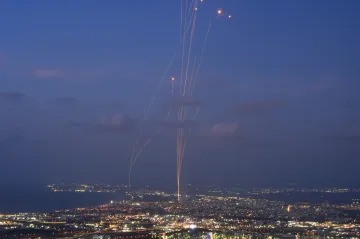Tel Aviv: Israeli Defence Minister Yoav Gallant said Israel's air strikes in Lebanon on Monday have destroyed tens of thousands of Hezbollah rockets, adding to the most difficult week for the Iran-backed movement since its creation. "Today is a significant peak. On this day we have taken out of order tens of thousands of rockets and precise munition. What Hezbollah has built over a period of 20 years since the second Lebanon War, is in fact being destroyed by the IDF," he said in a statement.
The Israeli military is preparing for the next stage of its operation in Lebanon after launching a wave of air strikes against Hezbollah targets on Monday morning, the military chief of the general staff Herzi Halevi said.
"Essentially, we are targeting combat infrastructure that Hezbollah has been building for the past 20 years. This is very significant. We are striking targets and preparing for the next phases," he said in a statement, giving no details but adding that he would "elaborate shortly".
WATCH: Israel intercepts rockets launched from Lebanon
Earlier, Israeli strikes on Monday killed more than 356 Lebanese in the deadliest barrage since the 2006 Israel-Hezbollah war as the Israeli military warned residents in southern and eastern Lebanon to evacuate ahead of a widening air campaign against Hezbollah. Thousands of Lebanese fled the south, and the main highway out of the southern port city of Sidon was jammed with cars heading toward Beirut in the biggest exodus since 2006. More than 1,000 people were wounded in the strikes — a staggering one-day toll for a country still reeling from a deadly attack on communication devices last week.
The death toll surpassed that of Beirut's devastating port explosion in 2020, when hundreds of tons of ammonium nitrate stored in a warehouse detonated, killing at least 218 people and wounding more than 6,000.
In a recorded message to Lebanese civilians, Israeli Prime Minister Benjamin Netanyahu urged them to heed Israeli calls to evacuate, saying “take this warning seriously.” “Please get out of harm’s way now,” Netanyahu said. “Once our operation is finished, you can come back safely to your homes.” The Israeli military said Monday evening it had carried out a targeted strike in Beirut. It did not give details.
Lebanon hospitals targetted
Lebanon’s state-run National News Agency reported the Beir al-Abed neighbourhood in southern Beirut was hit with three missiles. Hezbollah's Al-Manar TV said six people were wounded. The area was cordoned off and journalists were not allowed access.
Lebanese Health Minister Firass Abiad told a news conference in Beirut the earlier strikes hit hospitals, medical centres and ambulances. The government ordered schools and universities to close across most of the country and began preparing shelters for people displaced from the south.
The Israeli military announced it hit some 800 targets, saying it was going after Hezbollah weapons sites. Some strikes struck residential areas in the south and the eastern Bekaa Valley. One hit a wooded area as far away as Byblos in central Lebanon, more than 130 kilometres from the border north of Beirut.
The military said it was expanding the airstrikes to include areas of the valley along Lebanon’s eastern border with Syria. Hezbollah has long had an established presence in the valley, where the group was founded in 1982 with the help of Iran’s Revolutionary Guards.
Israeli military spokesman Rear Adm. Daniel Hagari repeated warnings urging residents to immediately evacuate areas where Hezbollah is storing weapons, including in the valley. The warnings left open the possibility some residents could live in or near targeted structures without knowing they are at risk.
(with inputs from agency)
ALSO READ: Lebanon: Over 270 people killed, 1024 injured in fresh Israeli airstrikes on Hezbollah targets
Latest World News
